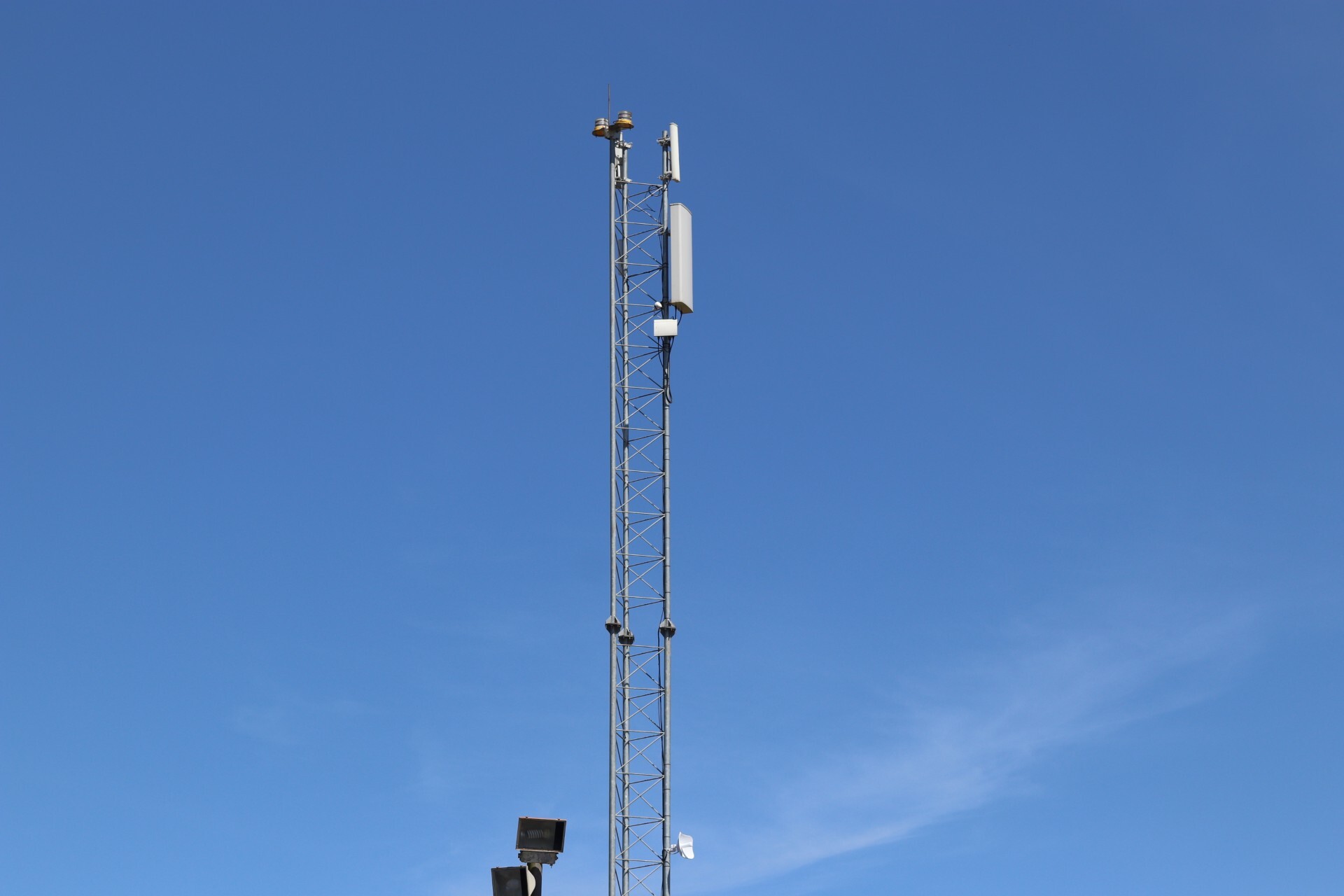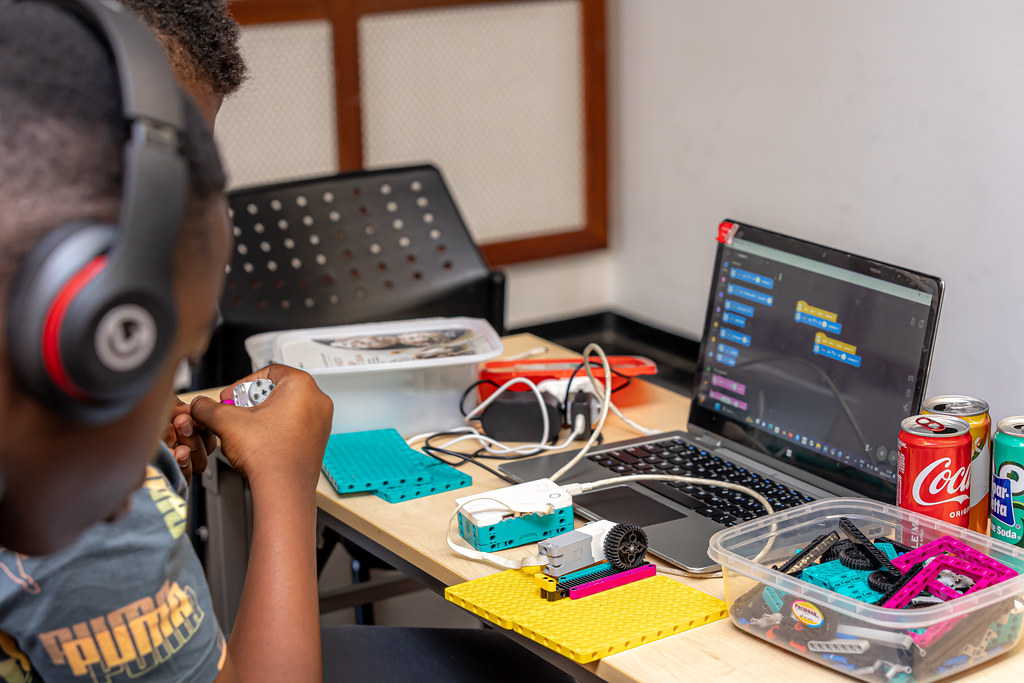South Africa
Empowering Youth for a Digital Future: Closing the Digital Divide and Paving the Way for a Thriving Digital Economy
August 30, 2024

Some young innovators who participated in the UNDP-supported Circular Economy Hackathon where over 100 young bright minds shared ideas on the circular economy. 12 solutions were selected and received cash prizes towards refining their ideas and further support in developing business plans.
This year’s theme for International Youth Day on August 12 “From Clicks to Progress: Youth Digital Pathways for Sustainable Development,” highlighted the crucial role that young people play in this digital age and how we need to enable their access to the many opportunities available in the digital ecosystem. International Youth Month provided an opportunity to amplify the transformative power of digital technologies to impact lives, solve some of the pressing global challenges, and call for more investments in technology to drive innovation and foster connectivity towards devising solutions to secure a sustainable future.
With South Africa having one of the highest youth unemployment rates globally, the newly formed Government of National Unity (GNU) has placed the issue of addressing unemployment at the centre of its priorities. According to Statistics South Africa, 45.5% of the youth population is unemployed, which necessitates urgent action and effective strategies to tackle youth unemployment for improved development outcomes. Youth unemployment restricts the earning potential of young people, hampers business growth, threatens social cohesion, and places a strain on public resources.
The UNDP South Africa “National Human Development Report 2022: Harnessing the Employability of South Africa’s Youth” identified the digital economy as a viable hub for job creation and recommended that the country leverages its opportunities by empowering youth for the new world of work. The report also notes the associated socioeconomic challenges that may hamper the digital revolution, particularly around digital literacy, infrastructure, and connectivity. These are challenges that many of UNDP’s South Africa inclusive growth programmes have been focussing on and seeking lasting solutions to.
Bridging the digital divide by empowering rural youths to participate in the digital economy
UNDP South Africa has been championing various youth-focused interventions to empower young people to thrive in the Fourth Industrial Revolution (4IR) and drive impactful innovations towards achieving the Sustainable Development Goals (SDGs). These include providing digital skills to unemployed youth and entrepreneurs, building ICT infrastructure (erecting public Wi-Fi hotspots and setting up libraries), supporting innovation through innovation challenges/hackathons and providing funding to young innovators, and digitising learning at Technical and Vocational Education and Training (TVET) colleges.
Advancing digital skills and access to digital platforms
Since 2022, UNDP has been driving a digital skilling project to empower unemployed youth and entrepreneurs to unlock employment and other income-generation opportunities within the digital economy. Participants in the Eastern Cape, Gauteng, and KwaZulu-Natal were introduced to coding, 3D, and drone technology, gaining competence in these areas and guided towards leveraging 4IR. As a result, most of the participants were provided with internships (some transitioning into lasting jobs) in various companies, while the entrepreneurs were supported with integrating digital technologies into their ventures for improved business outcomes. These efforts have led to 1,194 young people receiving digital skills training, with 719 securing jobs, and 40 entrepreneurs supported. Additionally, nearly 2000 young people accessed digital upskilling through the Future Skills Platform, all contributing to efforts to close the digital divide.
UNDP launched the “Automotive Training and Re-Skilling Vulnerable Youth and Women in South Africa” programme, with a component around digitising learning post-COVID-19. Three TVET colleges—Coastal KZN College, Northlink College, and Tshwane South College—benefited from this initiative, receiving electronic automotive components, training equipment, and ICT infrastructure for their training centres. Moreover, 64 youths completed an accredited Operator Development and Work Placement Programme, preparing them for entry-level roles as automotive manufacturing operators.
The project also supported the implementation of two strategic youth empowerment networks: SAYouth Mobi and Yakh’iFuture (Build Your Future). Through SAYouth, 12,230 students registered on the platform, with 694 securing employment or income-generating opportunities. Yakh’iFuture provided TVET college engineering students with the skills and training needed to build electrical devices and systems, equipping them to succeed in South Africa’s growing automotive components manufacturing sector.
Building ICT infrastructure and expanding connectivity
To expanding internet penetration in rural areas, UNDP supported women and youth-led Small, Medium, and Micro Enterprises SMMEs in rolling out TV White Spaces (TVWS) network technology in rural areas. TVWS uses unused radio frequencies originally set aside for TV broadcasting, offering the advantage of covering large areas and penetrating obstacles like buildings and trees. This makes it ideal for providing affordable internet in hard-to-reach areas. Through this initiative, SMMEs were capacitated to offer affordable digital connectivity via Wi-Fi hotspots at schools, clinics, taxi ranks, digital hubs, and other public facilities across the country. Over 183 public Wi-Fi hotspots have been erected, connecting 273 small businesses, over 2 637 households, and 56 public facilities, ultimately providing access to over 70,000 concurrent internet users daily collectively. Importantly, the beneficiary SMMEs have created 144 job opportunities for local youth and women.
To scale this work, UNDP set up a computer lab at Olwandle High School in Port Shepstone, KwaZulu-Natal. Connected to the TVWS network, this lab is designed and equipped to enhance the teaching and learning experience by aligning the school's curriculum with the demands of the digital age. Learners can now access online video tutorials, download previous question papers in preparation for exams, conduct research, and apply for university admission and other funding opportunities.
UNDP’s youth empowerment strategy through innovation focuses on equipping young people with digital skills, providing resources, and exposure to opportunities. By fostering entrepreneurial ecosystems, providing access to digital tools and funding, and promoting digital literacy, UNDP empowers youth to become job creators and innovators in the tech-driven economy. Through initiatives like Accelerator Labs, UNDP South Africa’s initiatives have been pivotal in advancing tech entrepreneurship and innovation among young people, laying the foundation for a sustainable future.
UNDP has empowered youth innovators to participate in the digital economy, particularly in supporting entrepreneurship in the sector, given that small businesses are considered the engine of growth in developing nations such as South Africa. Through various innovation challenges supporting a variety of sectors ranging from water and food security to energy and waste management, youth innovators were provided with technical skills development, business development support, access to prototyping facilities and programmes, access to seed funding and early-stage investment to commercialise their ideas.
Innovation Challenges, Hackathons and Ideation support
UNDP empowered university students to develop an advanced 4IR & Internet of Things (IoT) Flood Detection System designed to enhance KwaZulu-Natal's infrastructure resilience. This innovative solution monitors flood levels at electrical substations, alerting technicians via a mobile app and determining when to shut down substations to prevent damage during natural disasters.
In 2023, UNDP ran an online innovation challenge which focused on the circular economy and reached 93,000 young people nationally. Youth were engaged through a digital platform to submit videos describing their solution, communicate, and access skills training. In addition, over 150 of these youth were supported through a design-thinking hackathon to develop their ideas into prototypes and pilots.
Sky Vantage, a youth-owned company supported by UNDP, is tackling the issue of e-waste in communities by collecting electronic waste from various locations, such as municipal sites and busy public spaces, and manually disassembling and processing it to extract valuable components. Currently, Sky Vantage is piloting this innovative solution at Vaal University of Technology, with plans to expand to the Tshwane Municipality.
UNDP proudly supported the creation of Hydro Blü, an innovative Geospatial Data Science and machine learning solution designed to predict groundwater availability at nearly any location on earth. This cutting-edge tool helps hydrogeologists make informed decisions on where to drill boreholes, ensuring that communities with limited access to water can find reliable sources.
UNDP empowered young people as co-researchers, enabling 77 youth to gather crucial insights from over 10,000 community members in coal mining areas, guiding decisions on the Just Energy Transition.
During the COVID-19 lockdown, we couldn't access the most vulnerable communities, which resulted in us developing an innovative approach by training local youth to collect data using a mobile application, equipping them with technical skills and valuable knowledge in community engagement, sales, customer service, understanding vulnerability, and gender awareness. As a result, 55 youths quickly mobilised to gather data, distribute emergency relief vouchers, and advocate for COVID-19 safety measures, reaching over 6,800 households in less than three weeks.
Earlier this year, the launch of the Higher Education Innovation Fund (HEIF) marked an exciting milestone in empowering the next generation of innovators, an initiative to foster innovation and tech entrepreneurship among university and college students. The fund aims to solve challenges in the innovation ecosystem such as a lack of skilled student tech entrepreneurs who can develop and commercialise competitive innovative products, a lack of entrepreneurial support and networks at universities and colleges, and limited exposure to opportunities, mentoring and coaching.
The transformative impact of UNDP South Africa's digital youth initiatives is a testament to the power of strategic partnerships. By collaborating with our partners, including the Department of Higher Education and Training, Toyota South Africa Motors’ Toyota Manufacturing Academy (TMA), Department of Science and Innovation, Al Baraka Bank, Water Research Commission, Council for Scientific and Industrial Research (CSIR), City of Tshwane, Innovate Durban, Makerspace Foundation, and Business Process Enabling South Africa (BPESA), we have been able to impact change and can mobilise more resources necessary to empower young people and foster their active participation in the digital economy.

 Locations
Locations
















